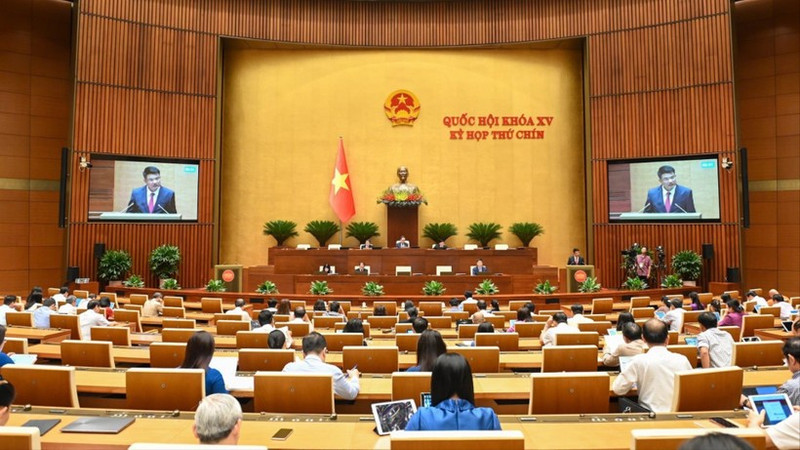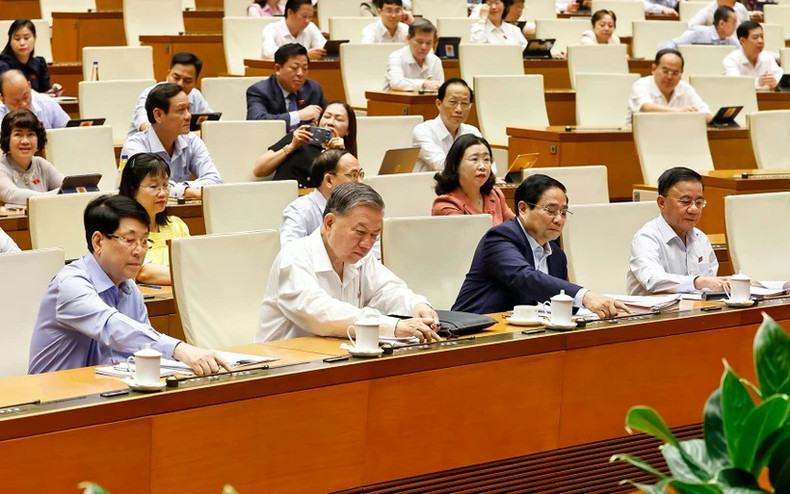Profound institutional reform for the nation’s future
On June 16, 2025, with unanimous approval from 100% of participating deputies, the National Assembly adopted a resolution amending key provisions of the Constitution of the Socialist Republic of Viet Nam. This marks a historic milestone, opening a new chapter of deep institutional reform to meet the requirements of development in the era of integration and renewal.

Amending the Constitution is not only a necessary legal step, but also demonstrates the strong political will of the entire Party, people, and army to build a modern national governance system which places people at the centre, thus laying the foundation for the country’s sustainable prosperity and happiness.
All nations around the world govern society through their constitutions and laws. The constitution is the fundamental law of each country, reflecting the will and aspirations of the entire people regarding the model of state organisation, human rights, and the basic rights and obligations of citizens.
Amending the constitution is always a significant political and legal event, requiring broad participation from all strata of society.
Practice has shown that the Constitution and laws of Viet Nam have been developed in accordance with international legal standards and practical requirements, ensuring the free development of the people, contributing to the building and maintenance of an orderly and stable society, and preventing organisations and individuals from abusing freedom and democracy to infringe upon human rights.
According to Deputy Nguyen Thi Viet Nga, Deputy Head of Hai Duong Province’s National Assembly delegation, the amendment of the Constitution not only stems from the practical requirements of the country, but also demonstrates the great political determination of our entire Party, people, and army in continuing to vigorously renew the organisation of the state apparatus, creating a solid legal framework for development in the new period.
Having gone through five constitutions since 1946, each has reflected the characteristics of its respective historical period in the cause of national protection, construction and development.
The most recent, the 2013 Constitution, creatively inherited the constitutions of 1946, 1959, 1980, and 1992, while institutionalising the Platform for National Construction during the transition to socialism (supplemented and developed in 2011).
However, in light of practical demands, as the country undergoes dramatic transformation and a resolute campaign to streamline the state apparatus, the study and amendment of the 2013 Constitution is both inevitable and appropriate.
The amendment process has been organised by the Party and State in an open, democratic, and scientific manner, strictly following procedures to maximise the people’s right to mastery, creating a solid legal foundation for restructuring the state apparatus to make it leaner and more effective, better meeting the tasks of national development and serving the people in the new era.
Our Party and State always ensure that constitutional amendments are made with a high degree of consensus within the political system and society, thereby creating momentum for the country to enter a period of rapid and sustainable development, serving the people to an even higher standard.
Nevertheless, taking advantage of the situation, hostile forces and political opportunists have spread distorted and false arguments, such as slandering the public consultation process as merely “formal”, “populist”, a “pre-arranged script”, “not accepting dissenting opinions”, or claiming that “the 2013 Constitution amendment is fundamentally not in the people’s interest, only in the Party’s”.
Such statements and opinions are not only one-sided and misrepresent the essence of the issue, but also clearly reveal intentions to incite scepticism and undermine the ideological and legal foundations of the socialist rule-of-law state of Viet Nam.
The aim of these actors is to sever the close relationship between the Party, State, and people, creating a sense of doubt and loss of trust among the masses in the political system and the Party’s leadership, thereby weakening social consensus, political stability, and the great national unity bloc.
These actors deliberately ignore the fact that constitutional amendment is an objective necessity, in line with development trends and the country’s renewal requirements.
Our Party and State always ensure that constitutional amendments are made with a high degree of consensus within the political system and society, thereby creating momentum for the country to enter a period of rapid and sustainable development, serving the people to an even higher standard.
According to Article 120 of the 2013 Constitution, which stipulates the amendment process, the committee on drafting amendments to the Constitution prepares the draft, collects public opinions, and submits the draft to the National Assembly.
At the same time, plenary sessions of the National Assembly discussing the amendment and supplementation of certain articles of the 2013 Constitution have been broadcast live on Viet Nam Television, the Voice of Viet Nam, and widely covered by the press, enabling the public to follow and supervise the process.
Public consultations have been conducted in various flexible and appropriate forms, utilising the use of information technology so that citizens can contribute not only in writing but also directly via the VNeID application, the National Assembly’s portal, and the Government’s portal.

The report on the results of public consultation from citizens, sectors, and all levels regarding the draft Resolution amending and supplementing certain articles of the 2013 Constitution states that the process was basically completed on schedule; some ministries, sectors, and localities even submitted their reports ahead of the May 30 2025 deadline.
In total, 280,226,909 comments were contributed by agencies, organisations, and individuals to the draft Resolution, demonstrating the high level of interest, support, and responsibility of all strata of society for the nation’s vital affairs.
The report also highlights innovative practices in some localities, such as creating dedicated online sections, enabling citizens to contribute via Google Forms and email, and developing feedback forms for members, association members, and citizens dealing with administrative procedures at public service counters.
This shows that the public consultation during the amendment of the 2013 Constitution was not merely “formal” or “populist” as hostile forces have slanderously claimed.
Throughout the leadership of the country, our Party has consistently determined that all legal reforms and constitutional amendments must serve the supreme goal of serving the people. In recent years, many suggestions from diverse perspectives have been received and considered with an open and receptive attitude.
However, this does not mean that every opinion is accepted. Opinions that are ill-intentioned, extreme, deny the nature of the socialist state of Viet Nam, demand the abolition of the leadership role of the Communist Party of Viet Nam, call for the separation of powers, or the depoliticisation of the armed forces are not “constructive criticism” but rather viewpoints opposed to the ideological foundation and political system of the country.
A truly democratic society is not one that tolerates reactionary and subversive ideas, but one that is orderly, disciplined, principled, and has boundaries to protect what is right and progressive for the common good.
Our Party has consistently determined that all legal reforms and constitutional amendments must serve the supreme goal of serving the people. In recent years, many suggestions from diverse perspectives have been received and considered with an open and receptive attitude.
The process of receiving feedback during the amendment of the 2013 Constitution has been conducted in a spirit of openness, scientific rigour, and in line with national interests, upholding the leadership role of the Communist Party of Viet Nam, remaining steadfast on the path to socialism, and is in no way a concession to disguised political schemes. This is responsible democracy, criticism within the framework of the law and the ethics of socialist society.
Looking more broadly, constitutional amendment is an inevitable trend for countries to adapt to changes in economics, society, and politics.
For example, in China, the Constitution was amended in 1988, 1993, 1999, 2004, and 2018. In Singapore, the 1965 Constitution has been amended many times to perfect the governance system. Germany has also amended its Basic Law (Constitution), in 2009 and most recently in 2019. These examples show that constitutional amendments help countries adjust their institutions to meet new development requirements.
The amendment of Viet Nam’s 2013 Constitution is a strategic decision aimed at building a leaner, more effective, and efficient state apparatus. The achievements from previous constitutional amendments and administrative reforms in many localities, such as Ha Noi and Ho Chi Minh City in recent times, have demonstrated the value of institutional reform.
To help the public fully understand the significance of this amendment, communication efforts should highlight the goal of building a modern governance system that meets the demands of development in the new era.
Amending the Constitution not only strengthens the legal framework but also serves as a driving force for Viet Nam to enter a period of prosperity and happiness, with a state apparatus that serves the people better than ever.








